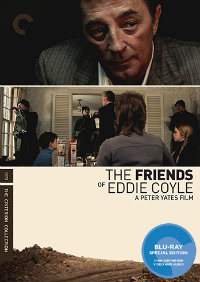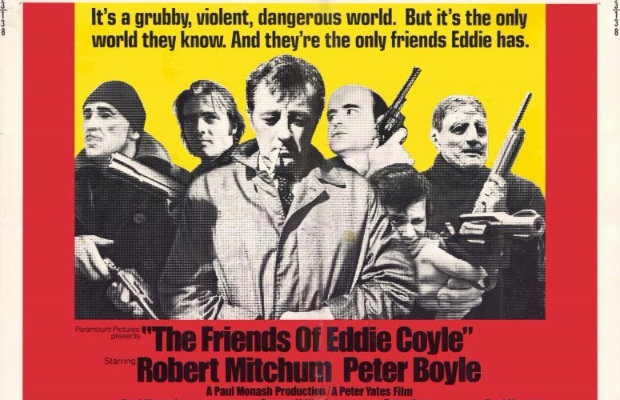
Based on a best selling novel by George V. Higgins, The Friends of Eddie Coyle was chiefly a vehicle for Hollywood legend Robert Mitchum, who at the time was 55 years old and in the midst of a transition from leading man to gravitas-laden character actor. The titular role here is tailor made for his uniquely tough yet lovable persona, although it carries an odd dynamic. Mitchum’s hang dog Eddie doesn’t participate in any of the film’s major action sequences, yet his brooding spirit dominates the proceedings like the ghostly conscience of a corrupt world where both cops and robbers have lost their bearings. It’s what’s inside Eddie’s head that fascinates the viewer – and the police – and his knowledge of the comings and goings of Boston’s thugs may prove to be the only thing separating him from doing hard time. When a group of Eddie’s pals launch a spree of clever bank robberies, the pressure on him to turn fink becomes impossible to resist.
While Eddie mulls his options – in a highly credible Bahstin accent – Yates and editor Patricia Jaffe treat us to an array of skillfully constructed set pieces of bank robberies and stake outs. These sequences start slowly but carefully build to crescendos of nail biting tension, and sharp eyed viewers will note distinct stylistic similarities to the 1960s crime dramas of Jean-Pierre Melville. While The Friends of Eddie Coyle is generally considered a second tier gangster film of this era, its sheer slow burn intensity ranks among such best-of-breed pictures as The Godfather (1972) and The French Connection (1971).
But perhaps the film’s greatest pleasure is the work of its stellar supporting cast. If one were to compile an A List of 1970s character actors, The Friends of Eddie Coyle would be an excellent place to start the research. From the great Alex Rocco as the gang’s mastermind to Joe Santos as his devoted associate to Peter Boyle as human slime, the film is packed with familiar faces, many of whom happily spent their entire careers playing either crooks or cops, with little need or opportunity for variety. Equally effective is the recently departed Matthew Cowles in one of his earliest roles, playing the iconic insolent redneck character that he revisited numerous times throughout his career.
The film also features a superb performance by the all but forgotten Steven Keats as a gun runner with a heart of gold. Keats would go on to be a staple of cop shows in the 70s and 80s; tragically committing suicide in 1994 at the age of 49. However, if a film can be stolen from Robert Mitchum – and that is open to debate – Richard Jordan’s turn as an ambitious Treasury agent nearly pulls it off. In a career that ran the gamut from Westerns to Woody Allen films, Jordan proved to be an extraordinarily versatile talent. He brought a refined, intelligent sort of darkness to his roles, and Jordan’s work here provides the catalyst for the film’s nihilist subtext. Lost to a brain tumor over 20 years ago at the age of 56, one can only imagine the fascinating characters a mature, seasoned Richard Jordan could have created. The Friends of Eddie Coyle makes his absence from today’s cinema all the more poignant.
Disc Review
The transfer retains the film’s original 1.85:1 aspect ratio and gets good marks for cleanliness and detail. Director of Photography Vic Kemper never quite achieved elite status among Hollywood cinematographers, but his professionalism and efficiency made him a favorite with a number of producers. The film’s grungy, available light aesthetic was a good fit for Kemper’s style, and many scenes have the look of Maysles‘ documentaries. Shadows are a bit mushy here and there, but it’s not distracting and generally fits the mood of the material quite well. The monaural track was constructed from the original 35mm mags, and critical listeners will note a wealth of sonic detail. The mix is well balanced, with dialogue and Dave Grusin’s superb period score dominating the proceedings.
Audio commentary featuring Yates
This commentary track was recorded in 2009 and ported over from Criterion’s DVD release of that year. Here, director Peter Yates offers his insights on Robert Mitchum’s unique methods of preparation, including the several weeks he spent patrolling and talking with Boston police officers and working class citizens. According to Yates, Mitchum’s goal was to not only recreate the proper accent, but the actual rhythms of local speech patterns. Yates also discusses the similarities between mobsters in Boston and London, and how both organizations acted under unique moral codes that forbade the harming of innocents unless absolutely necessary. In Yates‘ view, criminals of this era had an ethical humanity about them that has disappeared in today’s ever more violent and coarsening world. Yates passed away in 2011, after a lengthy career that included such hit films as Bullitt (1968) and Breaking Away (1979). We are fortunate to have his thoughts recorded for posterity, and listening to this track will greatly enhance viewer’s appreciation of the film.
Stills gallery
Here is an interactive selection of photographs from the film, including several images from deleted scenes.
PLUS: An essay by critic Kent Jones and a 1973 on-set profile of actor Robert Mitchum from Rolling Stone.
Presented in a 44 page booklet, Jones’ essay traces the relationships of the film’s characters and notes several aspects of The Friends of Eddie Coyle that make it unique to to the genre. The Rolling Stone piece, written by journalist Grover Lewis, offers an intimate portrait of Mitchum along with revealing and humorous insights from his friends and family. The booklet also features production stills, credits and notes on the transfer.
Final Thoughts
While The Friends of Eddie Coyle never achieved the iconic stature of the classic 1970s crime dramas, Criterion’s new blu-ray proves it to be a film with its own assortment of noteworthy pleasures. With fine performances and steely-eyed direction from Peter Yates, the film serves up absorbing tension aplenty, despite its relatively sparse action. Without thrilling car chases or orgies of exploding blood packets, The Friends of Eddie Coyle reveals itself as a nuanced expedition into the psychological landscape of crime. Consider it a think-em-up, as opposed to a shoot-em-up, that still delivers as an exciting and engaging entertainment.
Film: ★★★★/☆☆☆☆
Disc: ★★★★/☆☆☆☆
